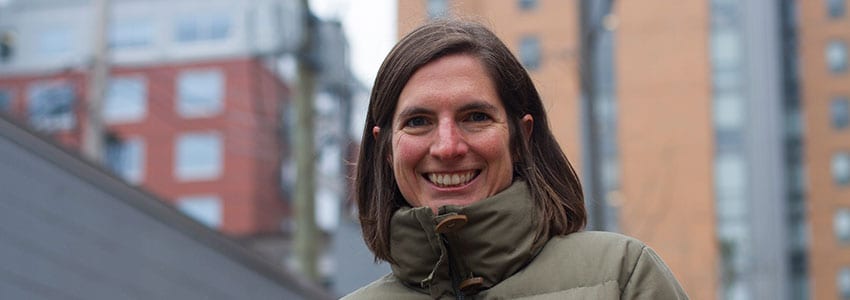Sarah was older than the average graduate student when she applied to U-M. With an M.S.W. already in hand, she had been working as a program evaluator for a homeless program in Louisville that housed individuals with severe mental illness or substance abuse issues. Her journey to grad school began with an interest in enhancing her skills and ability to be a program evaluator, and having found the joint program in Social Work and Sociology at U-M, she was taken with the interdisciplinary potential to bring a theoretical lens to her work by deepening her background in both fields.
As a new Michigan student, Sarah immersed herself in her new environment and found a special interest in the city of Detroit. “In particular, I was interested in the people who stayed in Detroit. You hear narratives of people leaving Detroit and how depopulation is a significant issue, but I’m interested in the narratives of people who stayed in Detroit and how they made sense of staying. The story portrayed often by the media is that the ‘stayers’ simply stay because they are stuck due to their economic circumstances. While a lot of Detroit is lower income, something with ‘being stuck’ or ‘left behind’ didn’t sit well with me, and I wondered how much this is really the case and how much might be something else going on.”
To collect her data, Sarah interviewed people in two particular Detroit neighborhoods: one with a long term history of depopulation and one with a consistent population level. She focuses on the experiences of the neighborhood, sentiments of the community, and the narrative of why they’re staying and how they make sense of staying. So far, the 37 interviews she collected have resulted in several different papers, with another paper to come that uses data from the Panel Study of Income Dynamics to see what the economic consequences are for people who don’t move.
In these depopulated neighborhoods, it wasn’t easy to find interview subjects, owing partly to the fact that the community has lost 30% of its population each decade. She says, “Some blocks had more people, but some were completely empty. I used a lot of different methods to find interview subjects: I went door to door and to the local food pantry every two weeks to distribute flyers, handed out flyers at bus stops and convenience stores, and from those flyers I received calls.
“What I’ve seen so far is that the relationships in both neighborhoods are deep: people are attached and connected to one another. Sociologists write about depopulated places as places where residents often are scared and lock themselves in their homes and don’t connect. Sure, the issues of crime and safety are significant concerns, but they don’t isolate or disconnect the neighborhood. Other research suggested there’s no community in these places, but that’s not the case here. People refer to their neighbors as family members,” Sarah explains.
It took some time for her to settle into her research space. Sarah recalls, “When I first started visiting Detroit, I was really naïve about the city. I romanticized it, but then I started interviewing people and quickly changed my perception. I see the issues residents are faced with – and I see a lot of great things going on. It’s exciting to see so much happening, but when you get out of downtown or midtown and talk to people, there’s a different feel, and I now have a more realistic notion of what’s happening in the entire city.”
Her experience at U-M has provided opportunity for deepening relationships of her own: “I really value my mentors and advisors; I think the world of my advisors. They have been fantastic. Faculty members in my department try to create a variety of workshops just for grad students to come and share their work.”
When she’s got the time, Sarah hits the road. An avid cyclist for over a decade, she raced for the U-M cycling club for the last few years. Now living outside Flint, she’s able to enjoy long rides on country roads outside of the city.
Part of the interdisciplinary nature of her work allows Sarah to keep her options open when pursuing a career path. “I enjoy research at the university, but I loved my work as a program evaluator and could do so much more work there.”

